‘Never again,’ protesters tell lawmakers
At least 10,000 assemble at Texas Capitol to urge politicians to do more to stop gun violence
Photos by Madison Olsen, Tomas Marrero and Robert Hall
“We are the change we never knew we needed, and we have found the strength that we never knew we were looking for,” Jack Haimowitz told a crowd of thousands at the Capitol. Some wept, but almost all cheered at the 18-year-old’s words. “The change that I truly wish to see is national unity. If we ever wish to fully overcome the hatred and fear on a scale such as this, we must unite as Americans regardless of the societal, racial and physical constructs put in place to hinder our unification.”
Haimowitz, a high school senior, was at Marjory Stoneman Douglas on Feb. 14, the day a gunman killed 17 of his classmates. The surviving students quickly made a name for themselves as they turned to political activism to demand their lawmakers establish gun control laws, organizing the March of Our Lives, a protest that took place on March 24. The gun control advocacy group Everytown for Gun Safety helped the students in planning the event.
“What took place on Feb. 14 not only stripped the students of Douglas of their innocence but it brutally ripped 17 lives from their homes,” Haimowitz said.
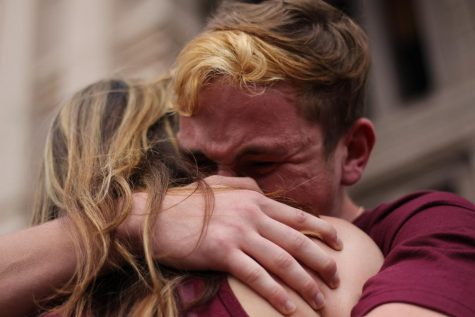
Thousands of demonstrators marched from Austin City Hall to the Capitol at noon on Saturday to take part in the March for Our Lives protest, which took place at more than 836 different cities all over the world.
According to its website, March for Our Lives has three demands of legislators: prohibiting assault weapons, preventing the sale of high-capacity magazines and closing loopholes in background checks and gun show purchases.
Demonstrator Michael Partridge said that he chose to attend the march to support families of victims of gun violence.
“I’m marching today because we need tremendous change in our gun laws, and I’m also marching to support all the individuals that have lost loved ones and friends and family that have been impacted by gun violence,” he said. “[I hope it achieves] tremendous awareness of the need to protect children in our schools and to change the gun laws at the federal and state levels.”
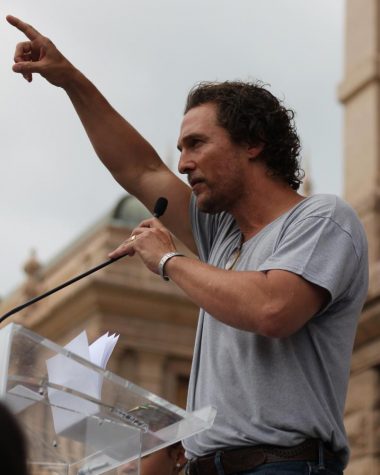
Speakers at the Capitol demonstration included politicians Mayor Steve Adler, State Rep. Gina Hinojosa, and State Senator Kirk Watson; also included were student school shooting survivors from Marjory Stoneman Douglas and Sandy Hook and other prominent figures, such as actor Matthew McConaughey.
“This is an American issue. It’s a Texan issue. It’s a legal and law-abiding gun owner issue. It’s a mother issue. It’s a father issue. And, quite literally, this is our children’s issue,” McConaughey told the assembled crowd in his remarks at the Texas Capitol. “My hope here is that we can find a common ground on what I see as very much a common-sense issue. This is an issue anchored in purpose for all of us. It’s not anchored in politics. God bless and just keep living.”
Several booths at the march encouraged protesters to take actions like registering to vote, joining Student Demand action and signing petitions.
A small group of counter-protesters set up across the street from the Capitol. One counter-protestor, who brought his sidearm and AR-15, said that the Second Amendment was an inalienable right, and that protestors were unwise to march to, in his words, “have their rights taken away”. He requested to remain anonymous.
“If these people decide not to exercise their Second Amendment, that’s fine, but they should not come to take that right away from others,” he said. “It’s the Constitution, it’s a right guaranteed to us in the Constitution by the founders of this country, and Americans should stand firm behind the foundations that have led to the great nation we have today.”
He also said that gun legislation would be futile in terms of keeping criminals from guns.
“Ultimately, criminals don’t follow regulations, they don’t follow laws, they don’t follow legislation,” he said. “So when you pass guns laws, you are only affecting those who respect law, which are not criminals. So legislation functionally just will not work. To address these problems like gun shootings, anti-bullying campaigns, these people should be marching out here against bullying, instituting programs that are inclusive of all people, to try to address emotionally-distressed students. Second of all, bad guns are always stopped only by good guns. When something goes wrong, [people] call the police, not because the police will show up with rocks but because they will show up with guns. Good guys with guns stop bad guys with guns. So if you have teachers that choose to have good training or are responsible, or you put armed officers in schools, the good guys are that much closer to the bad guys with guns, and ultimately that will protect the students.”
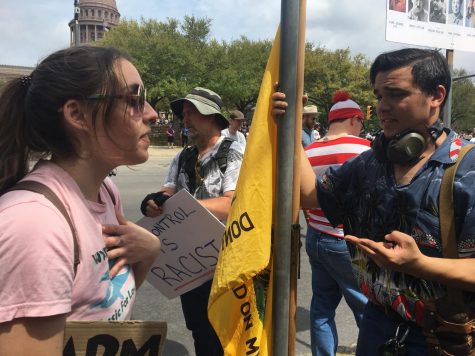
Another counter-protester, Joshua Schmidt, engaged in spirited but civil conversation with Taylor Cheyene, a protester for March for Our Lives. The two disagreed on much of what they discussed, but came to an agreement on their position against police brutality.
“It’s better to have conversations than shout,” Schmidt said.
Several protestors The Shield staff spoke with had moved to Austin from different countries with stricter gun laws, and expressed a desire for American legislature to follow suit. Katherine Berburg, who moved to Texas from Canada seven years ago, attended the march with her two children. Her daughter Saskia carried a sign encouraging politicians to turn gun stores into homeless shelters, which, according to Berburg, she came up with herself.
“They [her children] are going to be in schools one day, and I want to make sure that those are safe places,” Berburg said. “Also because I’m Canadian, and I come from a country where it’s not that easy to buy the kinds of weapons you can buy here, and I think it’s ridiculous that people can do that. I don’t think there’s a need for that in our society.”
Riku Meddala, who recently moved to Austin from Finland, attended the march with his daughter Maiju.
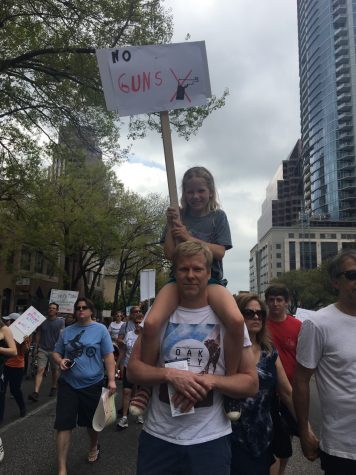
“I think that you have a great country, filled with a lot of great people, but this topic is a little bit irrational, and doesn’t make sense, at least coming from Northern Europe,” Meddala said. “We can’t vote, so we hope that Americans can make some change in this topic. I think it’s a topic where most everyone agrees, ‘Hey, this is not right. This is not how we should be’, and US is a sophisticated country, so I hope that we can make some change.”
Angela Rush, who has owned guns in the past, said that both responsible gun ownership and stricter gun legislature are essential to preventing gun deaths.
“I grew up in a place where we had shootings in my school,” Rush said. I don’t have a problem with people having guns, I do have problems with people having weapons that can kill large swaths of people that they can take into my children’s school. This has been an issue; Columbine was the first big one, and there’s little ones all the time. Y’all are growing up in this, it started whenever I was in school. I was in class the same day Columbine happened.”
Rush attended the march with her six-year-old son Trevin, who she says came for a school project.
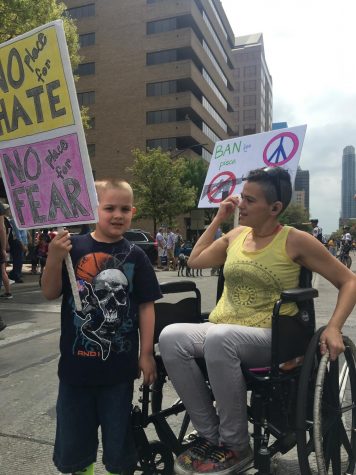
“He is very socially-conscious, and he wants to be the governor when he grows up,” she said. “We come to the Capitol a lot, and he’s interested in legislation and how to change it. I’m showing him, this is how we change it.”
Students from schools across the nation, including McCallum, are organizing another demonstration on April 20, the 19th anniversary of the Columbine High School shooting, with plans to walk out of schools and protest.
Junior Ting Goodfriend attended the march with her two moms. She said that she felt that students should not be afraid that a school shooting could take place at any moment.
“We should be able to go to school and not worry about the possibility of our safety being threatened,” she said. “I am a future voter, and I [am part of] the next generation who will affect who runs our country, and it’s important for me to show what I believe in.”
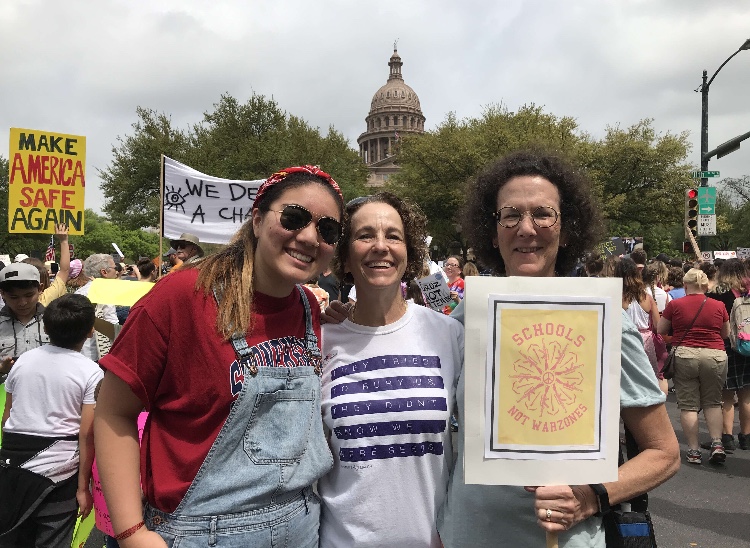
The Parkland students’ advocacy has achieved more than raising awareness; in March 2018, the Florida Legislators passed bill called the “Marjory Stoneman Douglas High School Public Safety Act, which allocated $400 million for gun safety measures. It raised the minimum age for buying firearms to 21, established waiting periods and background checks, provided a program to arm some teachers and hire school police, banned bump stocks and potentially violent or mentally unhealthy people arrested under certain laws from purchasing firearms. In all, it allocates around $400 million to moving forward on these changes. The governor signed the bill into law on March 9, saying at the time, “To the students of Marjory Stoneman Douglas High School, you made your voices heard. You didn’t let up and you fought until there was change.”
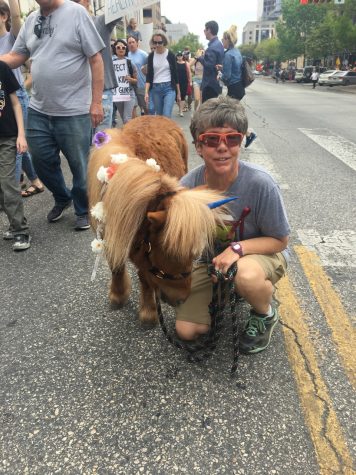
Junior Javi Cavazos Weems, who attended the march with friends and family, said that the Parkland survivors speaking out has been a major catalyst for change.
“[I marched] to protest gun violence across the nation, especially in schools, where kids shouldn’t have to fear for their lives in a place where they almost spend more time than their own homes,” he said. “Also, to send a message to our representatives that if they don’t pass common sense gun reform, we will vote them out of office.”
Melanie Miller, a retired teacher of 18 years who now owns a petting zoo, brought three of her miniature horses for the benefit of the children marching.
“I don’t think children should be afraid to be in school,” Miller said. “I didn’t like doing all the drills. It made me nervous. I am hoping that we can get some better gun laws out there. There’s no reason anyone needs a machine gun to protect themselves.”
Protestor Kathy Nunn said she attended the march out of worry for her granddaughter’s safety.
“Enough is enough, and we’re not going to continue to sit idly by while our children and grandchildren are slaughtered at school, which should be a place of learning and not of fear,” Nunn said.
David Reynolds, who said he protested against Vietnam 40 years ago, said that he and his wife believed that gun violence was an unnecessarily polarized issue that could be resolved by lawmakers. He also denounced politicians who worked with the National Rifle Association.
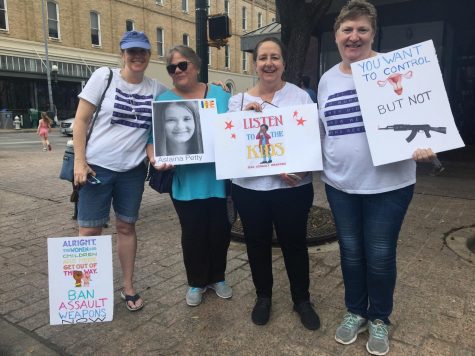
“We have a problem with our culture where guns are revered and sacrosanct and not treated as the dangerous things that they really are,” he said. “We have 18th century laws trying to control 21st century weapons.
Vivian Ballard protested with with several members of her book club, made up of mothers of Austin students. She urges everyone to look to the future when it comes to gun control.
“We believe that you kids are right; it’s time to stop gun violence,” she said. “I hope that it shows that there a lot of us who feel the same way: gun owners, non-gun-owners, parents of children, we all need to protect the future.”
[huge_it_portfolio id=”27″]
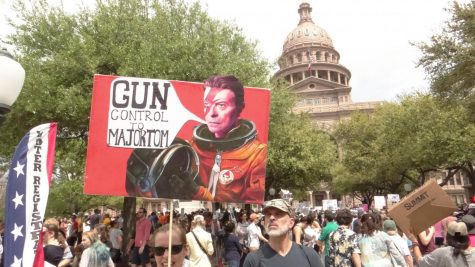
Video by Madison Olsen.
Video by Madison Olsen.
Your donation will support the student journalists of McCallum High School. Your contribution will allow us to purchase equipment and cover our annual website hosting costs.


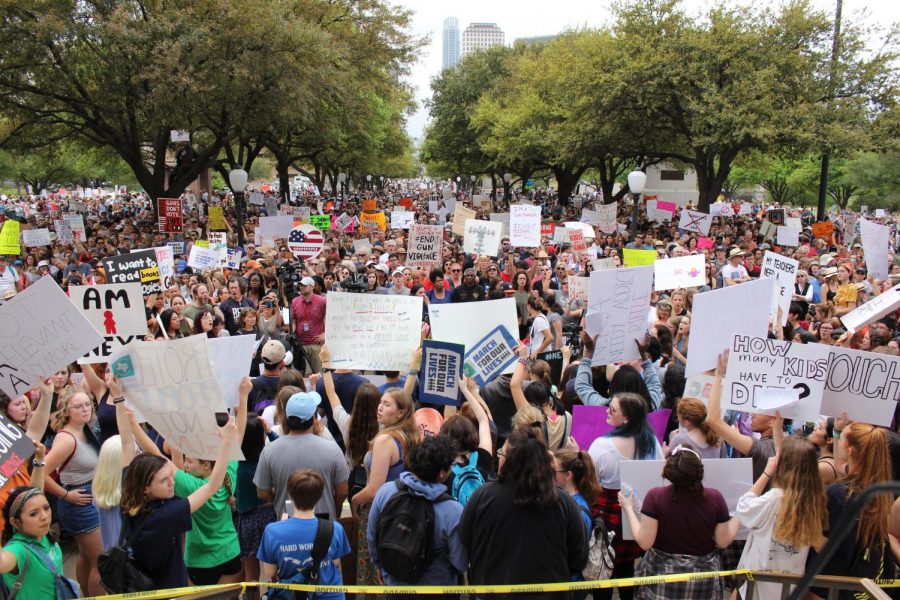
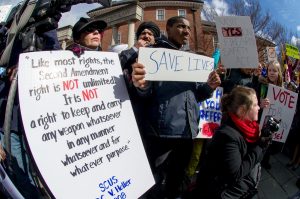
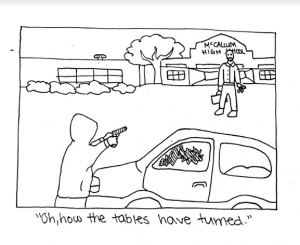
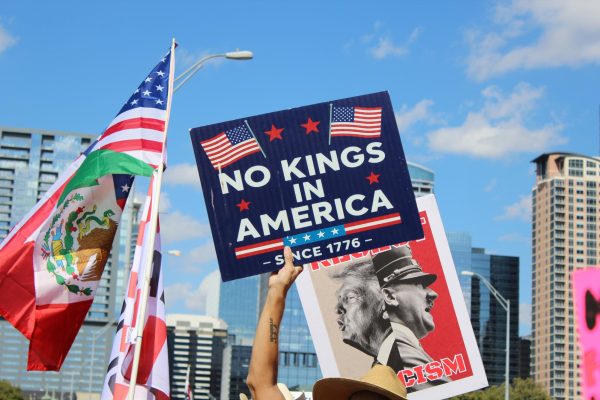
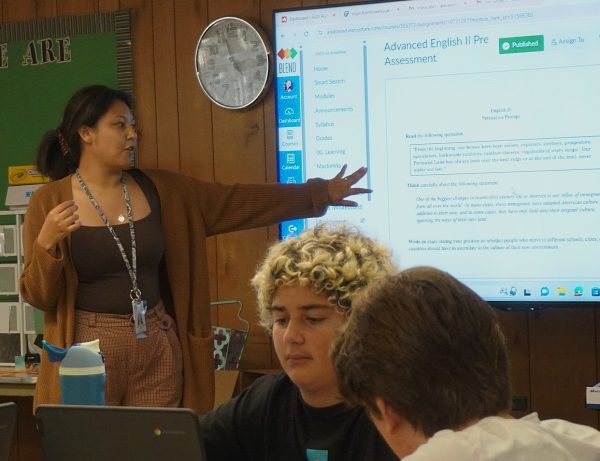
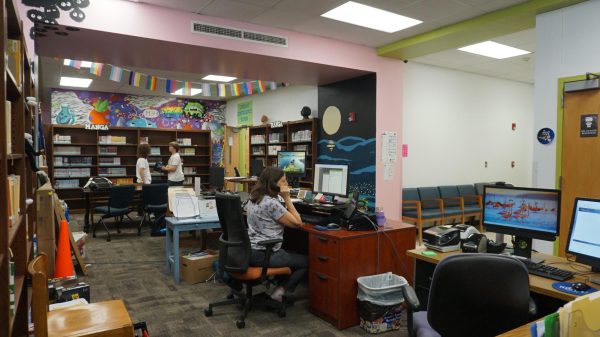


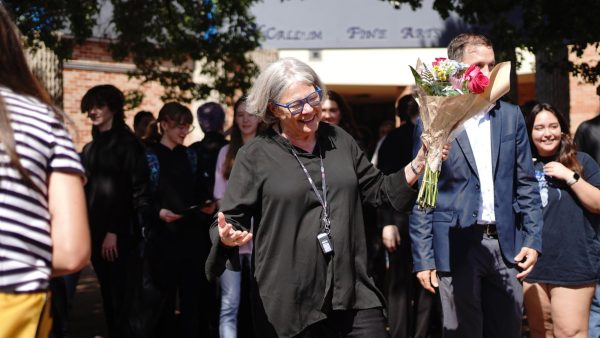

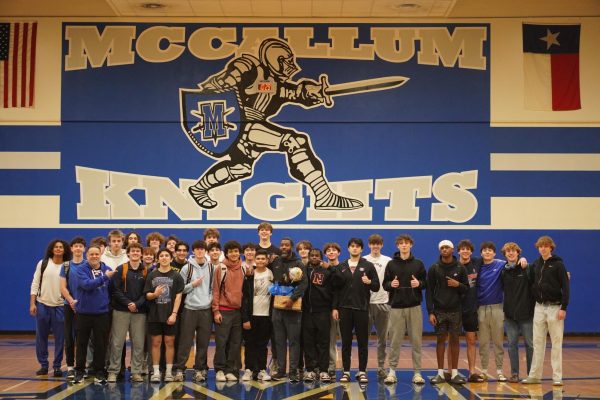
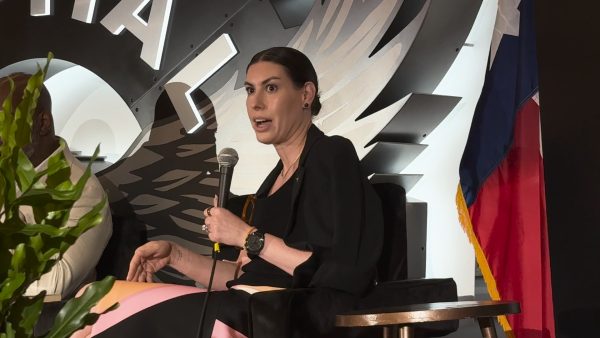
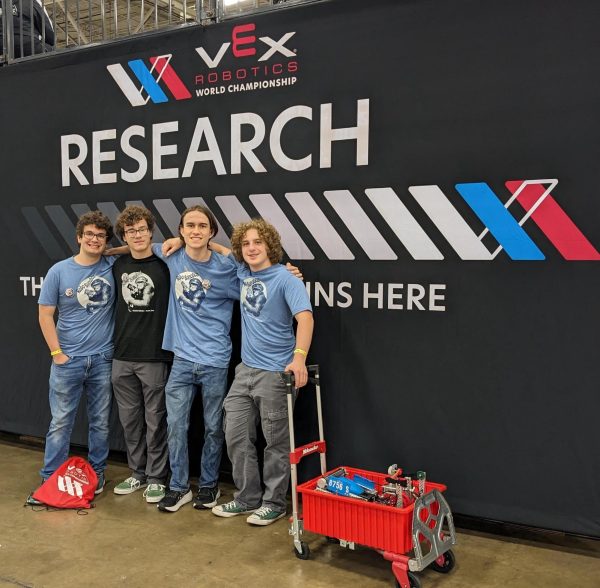
Harper • Mar 29, 2018 at 7:20 pm
I love this story it speaks the minds of a majority of the student population here and it is a story that should be told and something a lot of students know some about but should know more. It’s so inspiring to see my peers fighting for what they believe in.
Renee • Mar 29, 2018 at 3:25 pm
I had to leave the march early and wasn’t able to see all the speakers, so I’m very glad I was able to read this now. This coverage was very well detailed and the photos that went with it were very powerful. I was so proud to march with these people and I’m proud again to read about these more specific stories.
Graydon • Mar 26, 2018 at 1:56 pm
The march all together was a very powerful event in Austin. Because I was not able to go the the march, reading this article gave me information about what happened there and who spoke. Great job!
AJ Ryland • Mar 26, 2018 at 11:35 am
Great photos and terrific coverage of an important event!